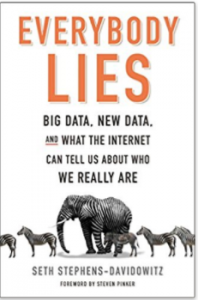
Everybody lies so where is the truth

Everybody lies is a fascinating, witty book, blending informed analysis of the signal and the noise and looks into new data sources, dominated by Google, where the author Seth Stephens previously worked. “I am convinced that Google searches are the most important data set ever collected on the human psyche”, he writes.
Data provides new vital information on sexuality, child abuse, abortion, advertising, religion, health and mental illness and this knowledge can certainly be used to improve public policy choices to tackle the inequities of our age.
According to Stephens-Davidiwitrz, search engines provide a brand of “digital truth serum” revealing our true selves, instead of publicly project personas.
On an average day in the early twenty-first century, human beings searching the internet will amass eight trillion gigabytes of data. The mountain of information can tell us a great deal about who we are, our fears, desires and behaviours that drive us and the critical decisions we make. What percentage of white voters didn’t vote for Barack Obama because he’s black? Do parents secretly favour boy children over girls? How we regularly do we lie about our sex lives? The answers are there on the internet, for all the questions you were afraid to ask before.
In Everybody lies, Stephens concludes that “Social science is becoming a real science,” and reveals how most social sciences was based on informed guesswork given imperfections of underlying data. The economist had a “physics envy” as their discipline lacks mathematical precision. The author raids PornHub, Wikipedia, Stormfront to reveal human prejudices and idiosyncrasies.
In the recent American Presidential election, he delved into examining data and the relationship between racism and voting patterns as Google search for N word highlighted that several Democrats in the North share similar racist view to Republicans in the South, although they are less public in expressing them. You are far more likely to confront someone with opposing political views online than you are offline. He finds the chance of a poor kid succeeding is as high as in any developed country in the world.
He also finds “Rich American women live on average, ten years longer than the poor American women and for men, the gap is fifteen years”.
Everybody Lies: What the Internet Can Tell Us About Who We Really Are by Seth Stephens-Davidowitz, Bloomsbury £20 Dey Street Books $27.99 352 pages

